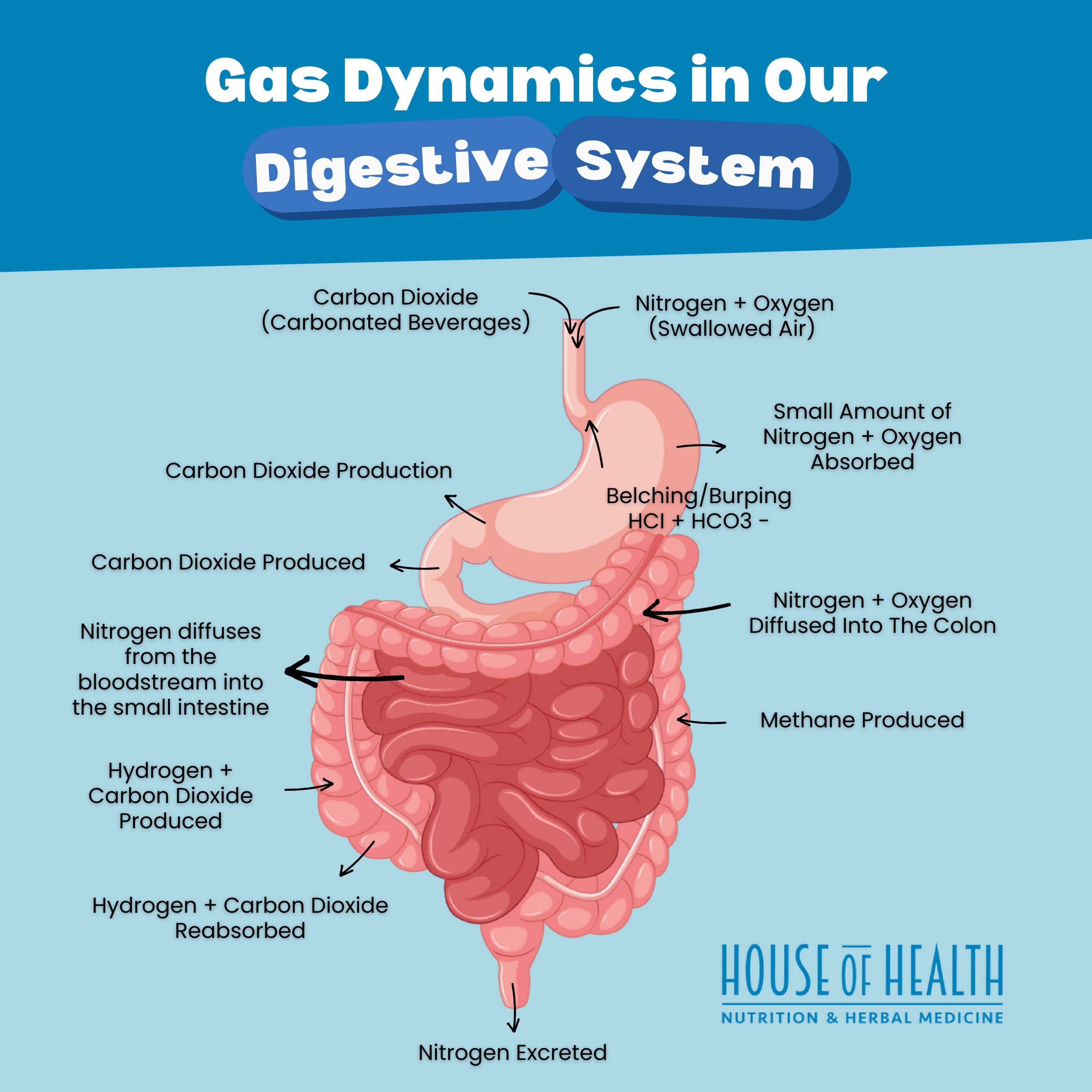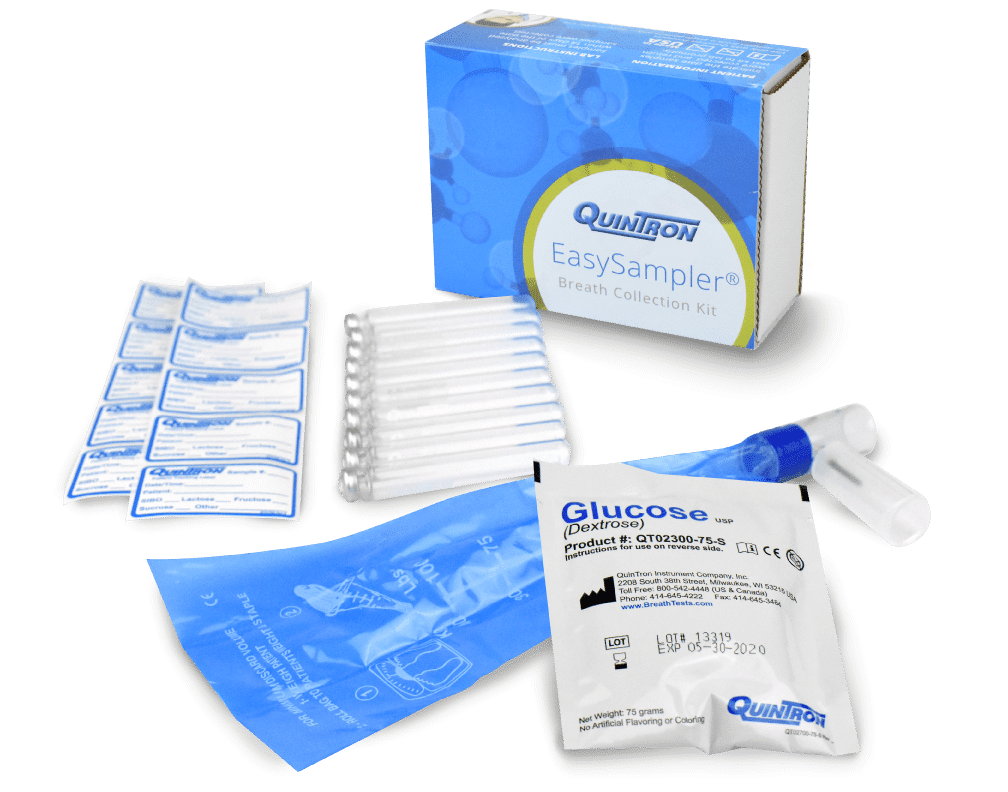
Abdominal bloating is a common discomfort experienced by many, often resulting from the complex processes occurring within the digestive tract. It occurs in nearly all people with irritable bowel syndrome (IBS) [ref] and may or may not be associated with visible distension of the abdomen.
Bloating is often caused by increased gas production or difficulty transporting gas within the GI tract, but it can also be a symptom of medical conditions, including delayed emptying of the stomach or small intestine, irritable bowel syndrome (IBS), small intestinal bacterial overgrowth (SIBO), dysbiosis (microbial imbalance), constipation, and some other digestive disorders.
The colon (otherwise known as the large intestine, or bowel) is a bustling ecosystem within our bodies, housing a diverse community of bacteria, yeasts, and fungi.
These microorganisms play a pivotal role in breaking down undigested carbohydrates, a process that frequently results in the production of gas, primarily in the form of hydrogen or methane (yes – those are the gases we can measure with breath testing). This gas accumulation is a major contributor to the sensation and appearance of a bloated abdomen.

Certain foods and dietary habits are notorious for exacerbating bloating and related digestive issues. For example, individuals with lactose intolerance are deficient in the enzyme lactase, which is needed to break down lactose, the naturally-occuring sugar in milk. This non-digestion of lactose leads to increased gas production upon consumption of certain dairy products.
Similarly, raffinose — a complex carbohydrate found in beans/legumes — and other fermentable carbohydrates such as fructans and galactooligosaccharides, which are present in foods such as onions, garlic, and wheat, can trigger bloating when they are fermented by gut bacteria.
It’s important to note that this is a normal process and should not cause undue digestive distress.
Additionally, certain lifestyle habits and conditions can influence bloating.
Eating too quickly, talking while eating, or consuming meals while under stress can increase air swallowing (aerophagia), which can contribute to bloating.
Habits such as chewing gum, smoking/vaping, or using tobacco products, as well as certain medications, including those for relief of the common cold, can also trigger bloating, depending on their ingredients and frequency of use.
There are many potential causes for abdominal bloating, so it’s best to work with an expert who can identify the causes of your symptoms and thus have a targeted approach to management.
Sharon Erdrich Tweet
From a scientific perspective, abdominal bloating is linked to several underlying mechanisms. These include an imbalance in the gut microbiota, where any overgrowth of gas-producing bacteria can lead to increased gas. Hypersensitivity to gas can make normal amounts of gas feel more uncomfortable.
Additionally, slow gastrointestinal transit time prolongs the fermentative time, resulting in increased gas in the intestines.
Read here for a researched-based overview of bloating.
To address bloating, diet modification can play a crucial role. Identifying and gradually increasing tolerance to trigger foods can help. High-fibre foods, while potentially triggering problems in the short term, are incredibly beneficial for gut health and should not be avoided. If introduced too quickly after avoidance, fibre can seemingly become a bigger problem, due to sudden increases in gas production.
Various natural remedies have been identified for their potential to alleviate bloating:
- Fennel contains anethole, a compound known for its anti-inflammatory properties and ability to ease digestion.
- Peppermint oil has been shown to relax the gastrointestinal tract muscles, reducing symptoms of bloating and gas.
- Chamomile offers anti-inflammatory benefits and has been studied for its effectiveness against gastrointestinal disorders.
- Liquorice root can soothe gastrointestinal inflammation and improve mucosal recovery, aiding in bloating relief.
- Ginger contains gingerol, which stimulates gastric emptying and can reduce bloating and gas.
- Lemon Balm, Caraway, and other herbs work by calming the digestive system and improving gut motility.
Moreover, the use of probiotics and digestive enzymes are a promising approach to managing bloating.
Probiotics can be of help in establishing and maintaining a balanced gut microbiota, potentially reducing the prevalence of gas-producing bacteria. Digestive enzymes facilitate the breakdown of difficult-to-digest carbohydrates, thus preventing the fermentation that leads to gas production.
In summary, abdominal bloating is a multifaceted condition influenced by diet, lifestyle, and the complex interplay of the gut microbiome.
Understanding these factors and implementing targeted dietary and lifestyle changes, along with the strategic use of natural remedies and supplements, can provide significant relief from bloating and improve overall digestive health.
Sunfiber®Partially Hydrolyzed Guar Gum (PHGG) Hydrogen-Methane Breath Test $9.50–$33.99 $179.90 – $455.00















